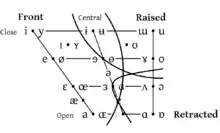Retracted vowel
A retracted vowel is a vowel sound in which the body or root of the tongue is pulled backward and downward into the pharynx. The most retracted cardinal vowels are [ɑ ɒ], which are so far back that the epiglottis may press against the back pharyngeal wall, and [ʌ ɔ]. Raised or front vowels may be partially retracted, for example by an adjacent uvular consonant or by vowel harmony based on retracted tongue root. In both cases, /i y e ø a o u/, for example, may be retracted to [ɪ ʏ ɛ œ ɑ ɔ ʊ̙].

Retracted vowels are one of three articulatory dimensions of vowel space
Retracted vowels and raised vowels constitute the traditional, but articulatorily inaccurate, category of back vowels.
References
- Moisik, Scott; Czaykowska-Higgins, Ewa; Esling, John H. (2012). "The Epilaryngeal Articulator: A New Conceptual Tool for Understanding Lingual-Laryngeal Contrasts" (PDF). Cite journal requires
|journal=(help)
This article is issued from Wikipedia. The text is licensed under Creative Commons - Attribution - Sharealike. Additional terms may apply for the media files.